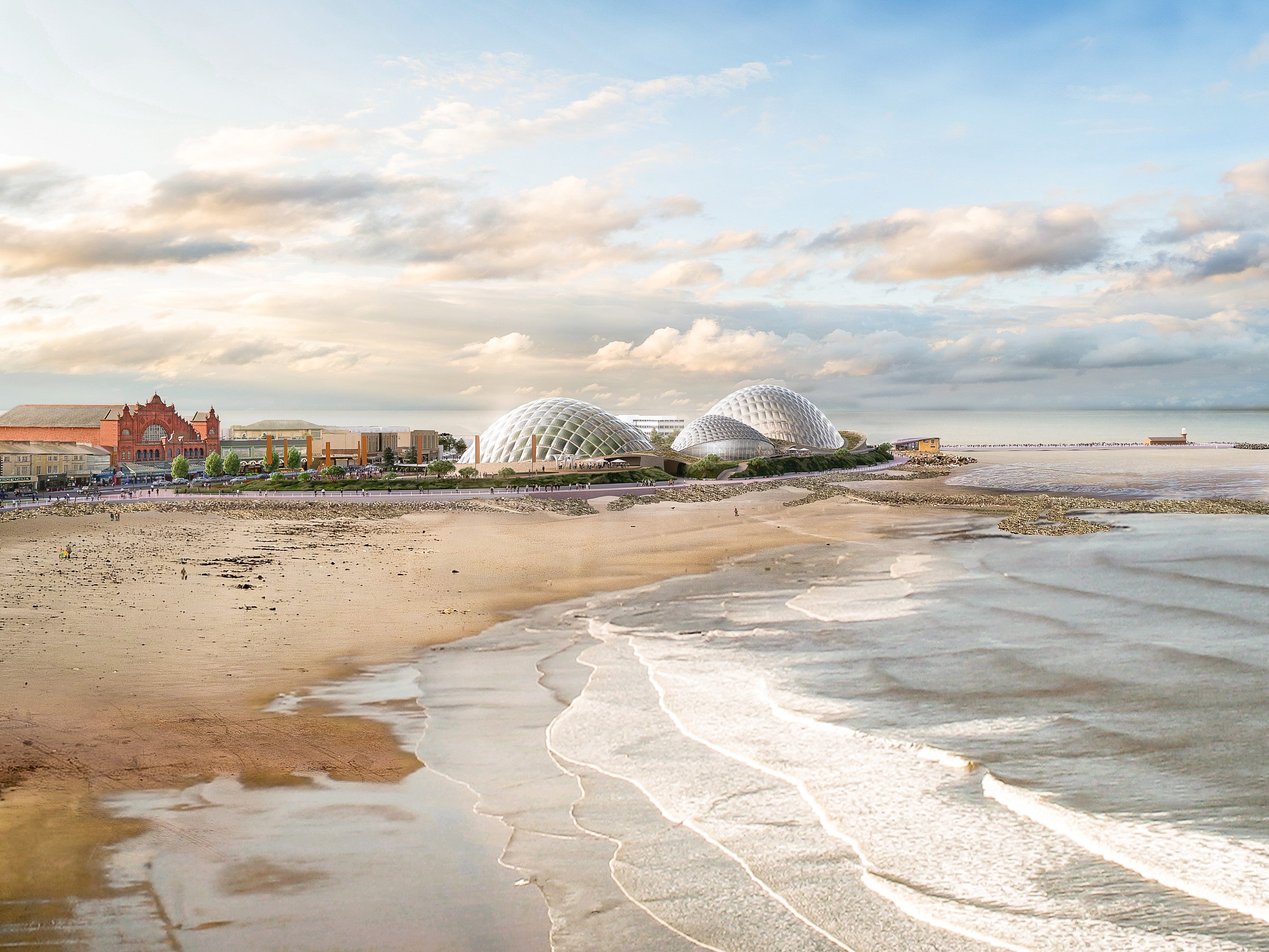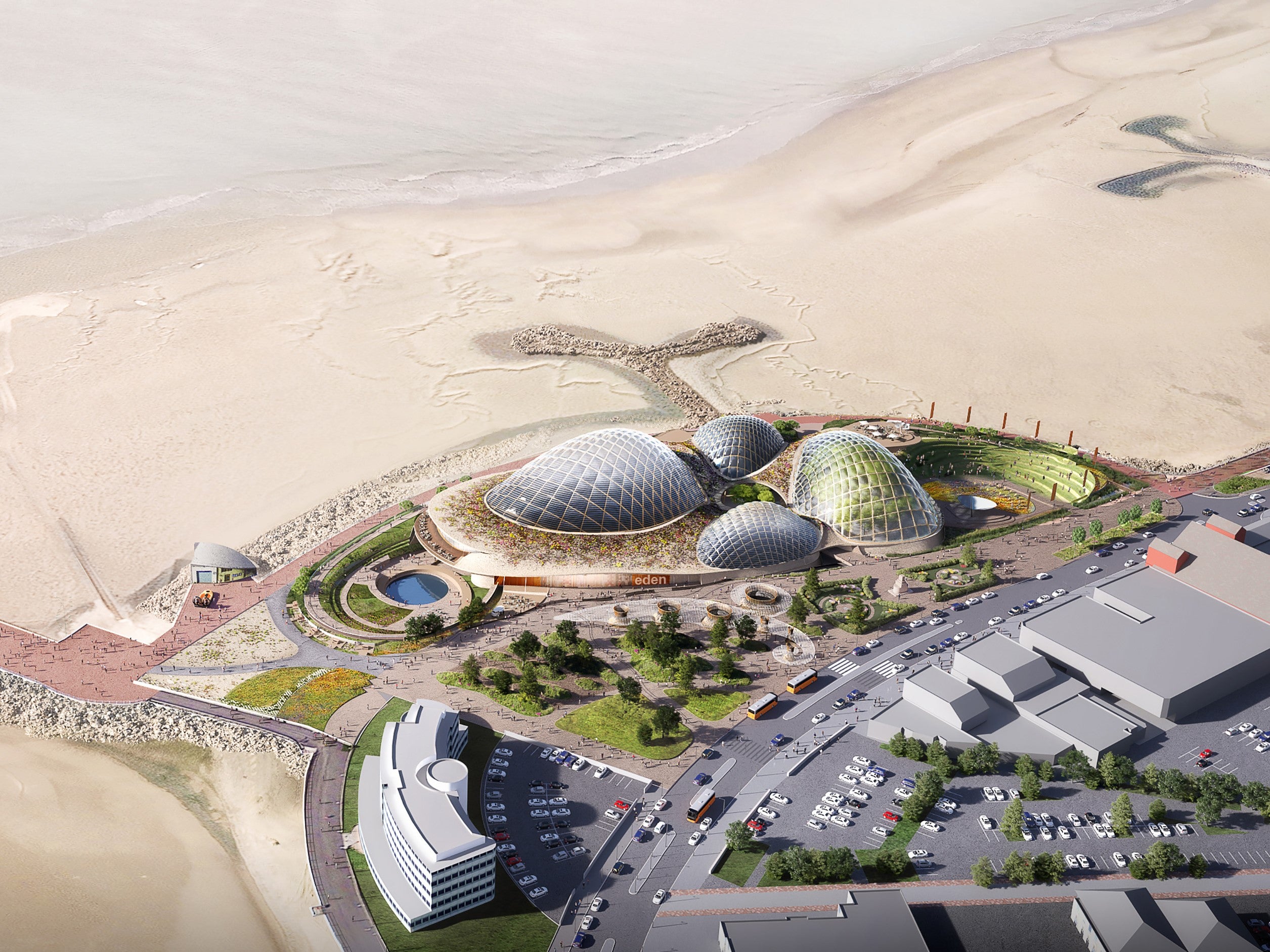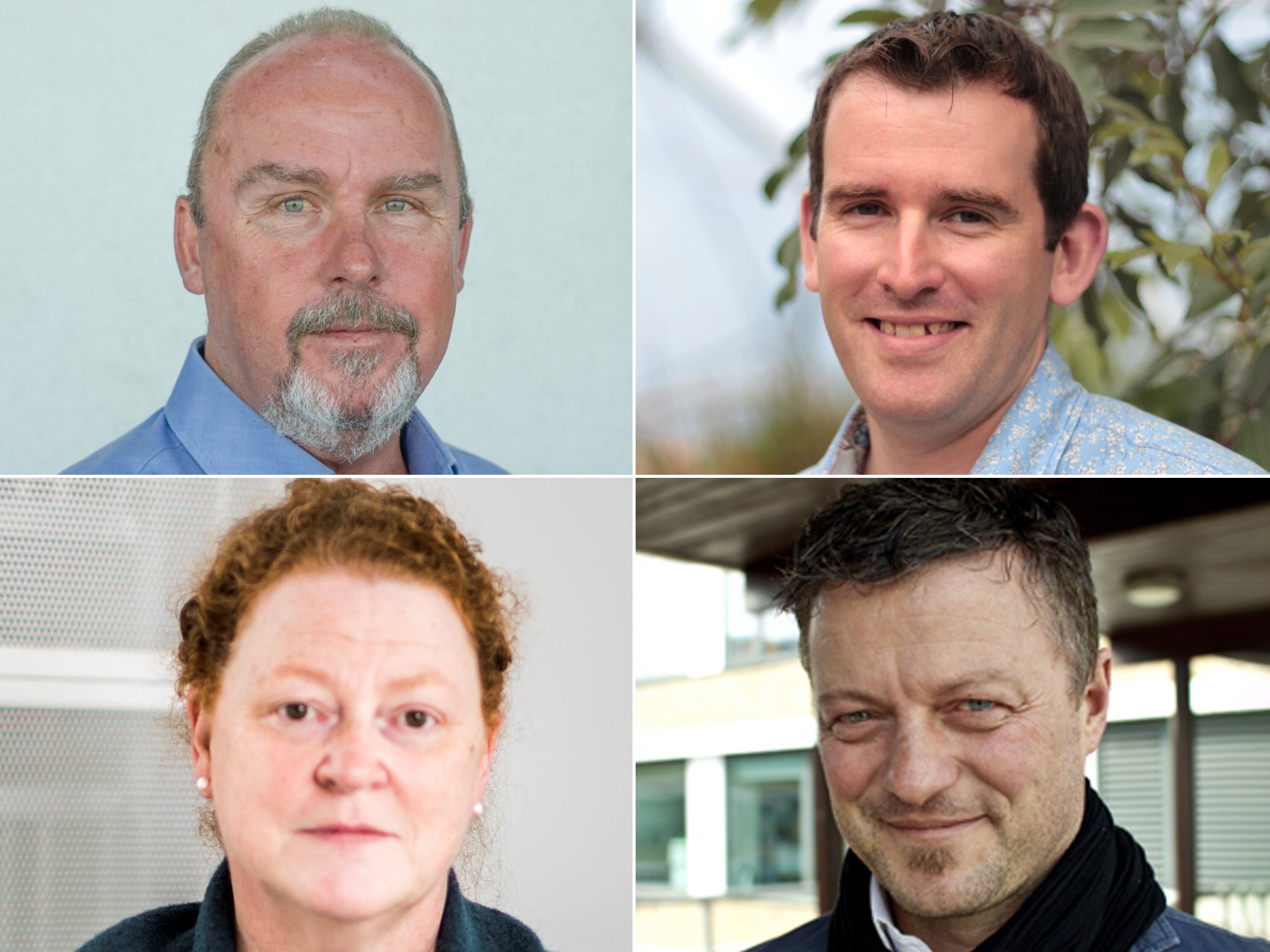Eden Project North: How ‘bonkers’ idea became lifeline for struggling seaside town
‘My first reaction was you want to build what, where?’ says university pro-vice-chancellor who has overseen £125m development which now will start going up in Morecambe this year

When Dame Sue Black was first told there were discussions being held about creating a new Eden Project in the seaside town of Morecambe, her immediate thought was the idea was “bonkers”.
It was 2018. She had just been appointed a pro-vice-chancellor at nearby Lancaster University where the idea for the eco-attraction had originally been mooted. No firm proposals or drawings yet existed but the talk was of a collection of mussel-shaped domes rising above the struggling Lancashire resort’s sea front.
“My first reaction was: ‘You want to build what, where?’” she says today. “It was bonkers. But, I think, almost instantly, I was completely [won over] by this vision because my goodness me – what a marvelous thing it could be. So, then the question becomes, can we really make it happen?”
On Monday, four years on, the answer was confirmed as a resounding yes.
At a planning committee of Lancaster City Council, permission for the £125m attraction – developed by the uni alongside the company behind the original Eden Project in Cornwall – was unanimously granted.
It means, later this year, work should finally begin turning that vision into reality.
Four glass and timber domes – yes, mussel-shaped – will be built on derelict land off the town’s Marine Road. Inside, performance spaces, immersive experiences, augmented reality exhibitions and observatories will explore the planet’s marine life, water worlds and climate issues. One exhibition will take people on a virtual reality journey of what might happen if global warming is not combated; another will show life in a water drop magnified billions of times. Outside, there will be a 6,000-capacity amphitheatre for live events as well as extensive science gardens.
“It will,” says Dame Black, “be world leading.”
If all goes to plan, the consequences of all this will be an effective lifeline for one of the UK’s most deprived coastal towns: some 760,000 visitors each year generating an estimated £47.3m annually for the local economy. It will, it is hoped, transform Morecambe’s future in the same way the original Eden did for the St Austell area of Cornwall. Such is the anticipation indeed, that local hotels have already started renovating in preparation. “Spades aren’t even in the ground yet,” says John O’Neill, manager of the Morecambe Business Improvement District, “and we are already seeing a swell of private investment coming into town and independent businesses setting up. It is already a major catalyst unlocking potential. It is creating a feel-good factor.”
Not bad, in short, for a bonkers idea.

Who exactly first proposed that Morecambe should become home to England’s second Eden isn’t today entirely clear. Some say that local man Ian Hughes – an environmental consultant by profession – put the idea to senior staff at Lancaster University around 2015. They, in turn – so the legend goes – spent two minutes laughing at the sheer ridiculous ambition of the proposal and then seven years working to make it happen.
“It was a mad idea,” says Dion Williams, director of research, enterprise and innovation at the uni and the person tasked with guiding the project to reality. “But it also made complete sense.
“Everything Eden does is about engaging citizens with science and the environment but also about lifting geographies. So, you take Morecambe and there is this unique landscape and bay – an area of special scientific interest – that offers real scientific opportunities for both tourism and research but you also have a town where there is a need for regeneration. It maps on perfectly.”
Eden Project International agreed with the analysis instantly.
In an early phone call between the university and David Harland, chief executive of EPI down in Cornwall, Williams recalls that “sparks of creativity” flew.
Almost immediately, the two new partners, the uni and EPI, started putting together a business case. Both the area’s local authorities – Lancashire County Council and Lancaster City Council – came on board. The local MP, conservative David Morris, facilitated meetings with government. Ministers and Whitehall officials repeatedly said they liked the idea and encouraged its development. Crucially, they made it plain: if the business case was there, public money would be made available to support it.
And then there were the people of Morecambe itself.
At an early public consultation, Dame Black remembers being nervous about going on stage to unveil the sheer scope of the plans for a town of just 33,000 people. “We thought we had a winning idea,” she says. “But it was such a big change we were suggesting that you do worry you’ll go on stage and have rotten tomatoes thrown.”
The tomatoes did not come. Rather, the feedback was almost entirely positive. In a 2018 anecdote, Harland recalled the local TV news – in search of balance – struggling to find anyone to speak out against the proposals. Some concerns about traffic and infrastructure overload were raised but, largely, there was a common consensus that the economic benefits were too overwhelming to ignore. The main feedback, says Dame Black, was “to get on and do it”.
Which is what they did.
Land was identified and acquired, a detailed business case was drawn up, money was raised, and meetings with government were held. Finally, last year, the planning application was submitted.
Key details within it explained how the attraction would employ 400 local people and support an additional 1,500 new jobs in the region. It made clear, too, that the attraction would practice the environmental lessons it preached. There will be no onsite car parking to encourage sustainable travel there, while the aim is for the site to eventually be powered by its own solar, wind and energy sources.
“The idea is that this will give to the environment more than it takes out,” says Harland.

The key now is funding.
While just £50m of the required £125m has so far been confirmed, the government – which has been asked to provide the remaining cash – has repeatedly said it wants to see the project succeed. In private, assurances are said to have been given that at least a significant chunk of funding would be announced once planning approval was granted. It is thought Michael Gove – the minister for levelling up – not only supports the development but sees the proposed domes as a highly visual potential symbol of the Conservative commitment to both the north and the climate.
“There couldn’t be a better exemplar of levelling up,” says David Morris. “This will have a generational impact on Morecambe, not just in driving economic regeneration but everything that comes with that: better educational outcomes, improved health, more jobs.”
Which brings us back once again to Dame Black. She, least of all, wishes to pre-empt the government move but she cannot hide her excitement at the thought of workers moving onto site.
She tells a story of an EPI director coming to Morecambe a couple of years ago, taking a photo of a glorious bay sunset and posting it to social media asking followers if they could guess where it was.
“People were coming back with Goa, Rio de Janeiro, the French Riviera,” she says. “No one said Morecambe, what a surprise. But the stunning beauty of this place, the amazing natural facilities we have here – the idea we will now open that up to people with this attraction – that is what has driven us all along.”
Join our commenting forum
Join thought-provoking conversations, follow other Independent readers and see their replies
Comments
Bookmark popover
Removed from bookmarks